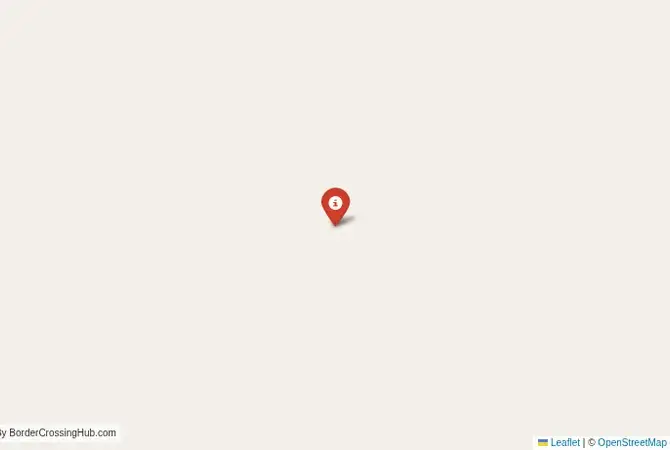
Approximate Border Location
Border Countries
- 🇰🇿Kazakhstan
- 🇷🇺Russia
Border Cities
- 🇰🇿Aksay (KAZ)
- 🇷🇺Ilek (RUS)
Wait Times
30-60 min for pedestrians/vehicles
Operating Hours
Open 24 hours
Crossing Types
Pedestrians, vehicles, commercial
Border Type
Land crossing via road
Peak Times
Mornings (7-10 AM), weekends
Daily Crossings
~6000 travelers/vehicles
Currency Exchange
Available near Aksay (KZT, RUB)
Safety Information
Generally safe, traffic hazards
Languages Spoken
Kazakh, Russian
Accessibility Features
Ramps, elevators
About Aksay (KAZ) & Ilek (RUS)
The Aksay-Ilek Crossing: The Orenburg Corridor
The border crossing near the Kazakh city of Aksay, which corresponds with the Russian post at Ilek, is a significant international gateway on the road connecting northwestern Kazakhstan with the southern Ural region of Russia. It is situated on the A-30 highway, the main route from the Kazakh oil and gas hub of Aksay to the major Russian industrial city of Orenburg. This is a border of substantial economic weight, constantly busy with a stream of commercial trucks, energy sector workers, and private travelers. The Ilek River flows nearby, marking the natural boundary in this region of wide, open steppe. Your journey through this crossing will be a formal and professional experience, a passage through a frontier that is vital to the integrated energy economies of both nations.
A History of Energy, Settlement, and Alliance
The Orenburg region has been a Russian stronghold and a center for trade with the Kazakh steppes since the 18th century. The city of Orenburg was a key administrative center for managing the vast territories of Central Asia. The discovery of massive natural gas deposits in the 20th century, particularly the Karachaganak field near Aksay in Kazakhstan, transformed the region’s economy. The development of this field, one of the largest in the world, was a Soviet-era project that created deep and lasting infrastructure links between the two sides of the border. The gas processing plant for the Karachaganak field is located in Orenburg, Russia. This means that raw gas from Kazakhstan is piped across the border to Russia for processing and then piped back. This unique economic interdependence makes the Aksay-Ilek crossing and the associated infrastructure absolutely critical. As members of the Eurasian Economic Union, both countries work to ensure the efficient flow of goods and personnel needed to sustain this vital energy partnership.
Before Crossing
Crossing borders gets messy sometimes, think political flare-ups or gates shutting fast. Good travel insurance is a must for handling doctor visits, trip disruptions, or security scares. Don’t get caught unprepared. To find a policy that’s got your back, check out reliable plans today for peace of mind.
The Border Crossing Procedure: A Professional Two-Sided Affair
The border facilities at Aksay and Ilek are large and accustomed to handling a high volume of traffic. The process is professional and bureaucratic, and you should plan for it to take between one and three hours, as the queues can be long, particularly with freight vehicles.
Exiting Kazakhstan (Aksay): You will arrive at the Kazakh border complex and be directed into lanes for cars or trucks. At the passport control booth, you must present your passport and your white Kazakh migration card. The officer will verify your documents, stamp your passport, and keep the migration card. Losing this card can lead to serious complications, so keep it safe. Following the immigration check, you will pass through a customs inspection. For most tourists, this is a relatively quick check of your vehicle and luggage before you are cleared to drive into the neutral zone.
Entering Russia (Ilek): At the Russian border post, you will first deal with immigration. You must have a valid Russian visa, which needs to be obtained in advance from a Russian consulate. Visas are not issued at the border. You will need to fill out a two-part Russian migration card. The immigration officer will check your passport and visa, keep one half of the migration card, and return the other half to you. This card must stay with your passport throughout your time in Russia. After clearing immigration, you will proceed to the customs area. If you are driving your own vehicle, you will need to fill out a temporary import declaration. Russian customs officials may ask you to open your luggage for inspection and will check your vehicle. The process is formal and by-the-book.
Route, Road Conditions, and Necessary Documents
The crossing is on the A-30 highway, a major regional road. The quality of the road surface can be inconsistent, with some well-maintained sections and others showing wear and tear from heavy trucks and the harsh climate. The landscape is predominantly flat, agricultural steppe. When driving, the most important documents you will need are your vehicle’s registration certificate, your international driving permit, and your international vehicle insurance (Green Card). It is essential that your insurance policy explicitly lists both KZ and RUS as covered territories. You will be required to show this at the Russian border. Make sure your vehicle is in good mechanical condition and that you have sufficient fuel, as services can be spread out.
Final Planning Advice
The Aksay-Ilek crossing is a standard, busy, and professional border post. Your experience will be smooth if you are well-prepared. The number one priority is securing your Russian visa long before your trip begins. The second is safeguarding your Kazakh migration card. For drivers, confirming your vehicle’s insurance coverage for both countries is a critical step. This crossing is the most direct route to the historic city of Orenburg, a gateway to Russia’s Ural Mountains region. By approaching the crossing with all your documents in perfect order and a patient attitude, you can successfully navigate this important economic corridor and continue your journey through the vast Eurasian heartland.
No reviews yet.
